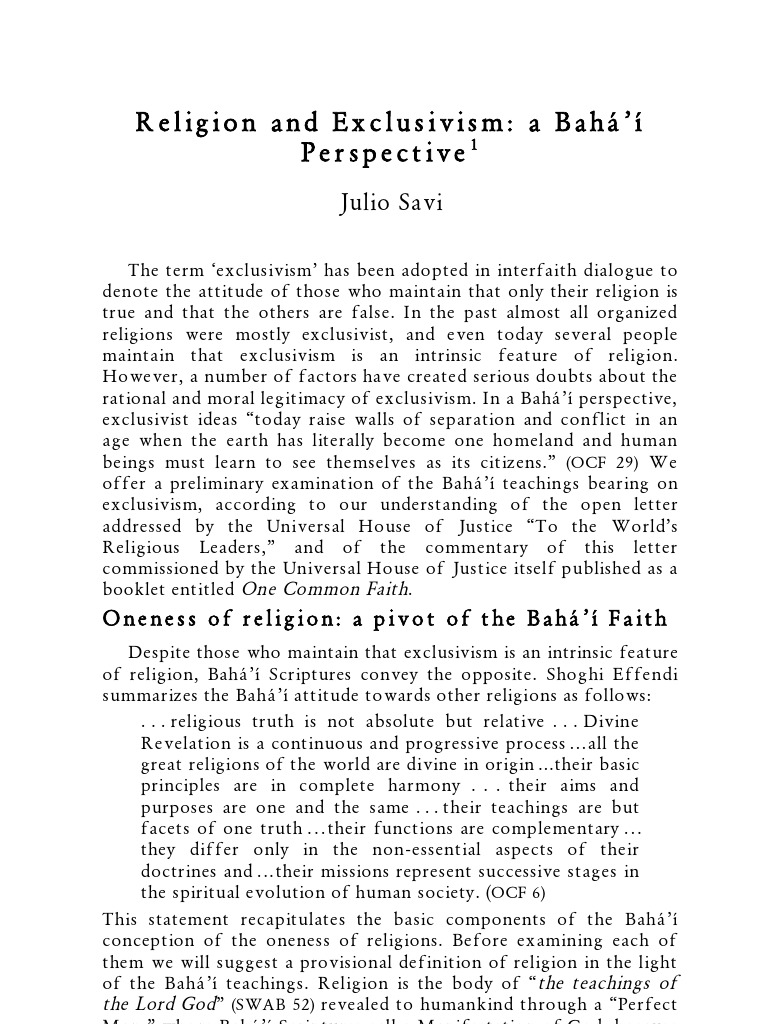The Bahá’í perspective on reframing religion offers an enlightening discourse, one that seeks to transcend the dichotomies prevalent in contemporary religious thought. In a world often marred by sectarianism and division, the Bahá’í teachings provide a refreshing lens through which to view the concept of religion itself, much like a prism dispersing light into a spectrum of colors, each representing a unique path to understanding the divine.
To embark on this exploration, it is essential to consider the foundational principles that undergird Bahá’í thought. At its core lies the conviction that all religions are inherently united. Each faith, from the primal roots of humanity’s earliest spiritual articulations to the modern expressions of faith, reflects an evolving understanding of God, which can be seen as a tapestry woven with threads of divine guidance. Bahá’u’lláh, the Prophet-Founder of the Bahá’í Faith, posits that humanity has been continually graced with divine revelations, each tailored to the needs and capacities of the age it addressed.
The metaphor of a garden beautifully encapsulates the Bahá’í view of religion. Just as diverse flowers coexist within a garden, thriving in their unique environments yet contributing to the overall beauty, so too do the world’s religions coexist. The Bahá’í teachings eschew any form of religious exclusivism, advocating instead for an inclusive approach that acknowledges the validity of different faiths. This perspective cultivates a sense of interconnectedness among humanity, wherein every belief system can be appreciated as an expression of one divine truth—an essence that transcends cultural and temporal boundaries.
Central to the reframing of religion within the Bahá’í framework is the concept of unity. Unity is not merely a lofty ideal but a practical necessity in an age characterized by global interdependence. Bahá’í teachings emphasize that the fundamental purpose of religion is to foster unity among people. In this context, religion serves as a unifying force, comparable to an orchestra where various instruments, despite their differences, create a harmonious symphony when played in concert. This symphony of beliefs can shift the collective consciousness toward mutual understanding and respect.
The Bahá’í perspective further challenges the traditional notion of religious orthodoxy by advocating for the continuous reinterpretation of spiritual texts and doctrines. Such an approach is reminiscent of a river that carves new paths as it flows, adapting to the contours of the landscape it traverses. This dynamic interpretation allows for a relevancy that resonates with the contemporary human experience, ensuring that the teachings remain applicable and vital through the ages.
In advancing the theme of evolution in spiritual understanding, the Bahá’í teachings emphasize the importance of science and reason as compatible allies of faith. The intersection of scientific inquiry and religious belief is likened to the dual wings of a bird, each necessary for flight. Religion, when informed by reason, can illuminate the human experience in profound ways, offering not only solace but also a framework for ethical living. Science, conversely, expands our understanding of the natural world, enriching the spiritual quest. The harmony of these two realms paves the way for a holistic understanding of life.
Moreover, the Bahá’í Faith advocates for personal and communal transformation as pivotal elements in reframing religion. It encourages individuals to engage actively in the process of spiritual refinement. This can be viewed as the metamorphosis of a caterpillar into a butterfly—a transformative journey that leads to a higher state of being. Such a transition necessitates the cultivation of virtues, such as compassion, justice, and humility. As individuals embody these attributes, they contribute to a collective awakening that reverberates throughout society, enhancing the overall moral fabric.
The Bahá’í teachings also stress the significance of service to humanity. Service emerges as an expression of love and an embodiment of spiritual beliefs in action. It is through selfless service that individuals can experience the fulfillment of their spiritual aspirations. The metaphor of a candle can be aptly employed here, illuminating the path for others while also brightening its own existence. Consequently, by promoting altruism and social responsibility, Bahá’í teachings inspire a movement towards a more just and equitable world, resonating with the universal quest for purpose and meaning.
Another compelling facet of the Bahá’í approach to reframing religion is its emphasis on the importance of education. Education serves as a powerful catalyst for societal progress, akin to the dawn that dispels the darkness of ignorance. The Bahá’í teachings underscore the necessity of empowering individuals, particularly women and marginalized communities, through access to knowledge. This commitment to education fosters a culture of critical thinking and informed decision-making, nurturing a populace that values inquiry and innovation.
In conclusion, the Bahá’í perspective on reframing religion provides a transformative lens through which to view the human quest for spiritual understanding. By advocating for unity, adaptability, and the integration of reason and faith, the Bahá’í teachings present an inclusive and harmonious approach to spirituality. The metaphors employed throughout—whether the garden of diverse beliefs, the orchestra of collective harmony, or the journey of metamorphosis—serve to underline the unique appeal of this paradigm. Ultimately, the Bahá’í Faith invites humanity to embark on a shared journey towards collective enlightenment, where the reframing of religion becomes both a personal and communal endeavor, enriching the tapestry of human existence.
